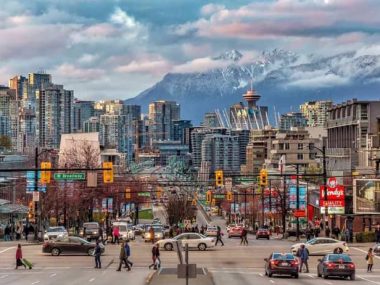Working in Canada: Eligibility, Application Process for Work Permits
Introduction:
If you’re looking to move to Canada and work, obtaining a work permit is a crucial step in the process. A work permit is a document that allows you to legally work in Canada for a specified period. In this article, we will provide you with an overview of the eligibility criteria, types of work permits available, and the application process for obtaining a work permit in Canada. We will also provide helpful tips to make the process as smooth and user-friendly as possible. With the right information and preparation, you can successfully navigate the process and secure your work permit.
Eligibility Requirements:
To be eligible for a work permit in Canada, individuals must have a valid job offer from a Canadian employer who has been approved by the government to hire foreign workers through the Labor Market Impact Assessment (LMIA) process. Additionally, applicants must meet the educational and language proficiency requirements for the job, which can vary depending on the position. Language proficiency can be demonstrated through tests such as the International English Language Testing System (IELTS) or the Canadian English Language Proficiency Index Program (CELPIP). A medical examination may also be required to ensure the applicant is not a risk to public health or safety. It’s important to note that meeting these requirements does not guarantee a work permit, as the final decision is made by an immigration officer who assesses the applicant’s overall qualifications. To increase your chances of success, thoroughly research and understand the requirements before submitting your application.
READ ALSO: HOW TO GET WORK PERMIT IN CANADA
Different Types of Work Permits:
When applying for a work permit in Canada, it’s important to be aware of the different types of permits available, as each one has its own specific requirements and application process. The main types of work permits include:
- Open Work Permits: These permits are not job-specific and allow the holder to work for any employer in Canada. It typically issue them to certain groups of people, such as spouses of skilled workers, international students, and young workers participating in special programs.
- Employer-Specific Work Permits: These permits are tied to a specific job and employer. They are typically issued to individuals who have a job offer from a Canadian employer and have applied for permanent residence in Canada.
- Post-Graduation Work Permits: These permits are issued to international students who have graduated from a designated learning institution in Canada. These permits allow graduates to work for any employer in Canada for a certain period of time after graduation.
- Self-Employed Work Permits: This permit is for individuals who plan to be self-employed in Canada.
It’s important to note that some types of work permits may require a Labor Market Impact Assessment (LMIA) from the Canadian government. Additionally, the processing times and fees for each type of permit may vary. To ensure you apply for the correct type of permit, it’s best to consult the Government of Canada’s website or a Canadian visa office for more detailed information.
READ ALSO: USA Jobs For Immigrants – Work In USA
Work Permit for Foreign Students:
Foreign students who have completed their studies in Canada have the opportunity to apply for a work permit. This allows them to gain valuable work experience in Canada andtransition to permanent residency in the future. To be eligible for a post-graduation work permit, foreign students must meet certain criteria including:
- Having a valid study permit
- Having graduated from a designated learning institution (DLI) in Canada
- Meeting certain language proficiency requirements
To apply for a post-graduation work permit, students will need to provide certain documents such as:
- Graduation certificate
- Proof of language proficiency (i.e. IELTS or CELPIP results)
- A valid study permit
It’s important to note that the processing time for a post-graduation work permit application can vary and it’s recommended to submit the application as soon as possible after graduation. Additionally, a post-graduation work permit is typically valid for up to three years.
It’s recommended to check the Government of Canada website or consult with a visa office for specific details, as the requirements and process can change over time.
READ ALSO: Top Insurance Companies in the US
Work Permit for Self-Employed Individuals:
Self-employed individuals who wish to work in Canada may apply for a work permit. To be eligible, they must demonstrate that their work will be of significant benefit to Canada, and that they have the necessary qualifications and experience.
The requirements and process for self-employed work permits can vary depending on the individual’s field of work. For example, self-employed artists, athletes, and performers may have different requirements than self-employed business people. It is recommended to check the Government of Canada website or consult with a visa office for specific details on the requirements and application process for your field of work.
Typically, the application process for a self-employed work permit includes submitting a detailed business plan, demonstrating sufficient financial resources to support yourself and your business in Canada, and providing evidence of relevant qualifications and experience.
It’s important to note that obtaining a self-employed work permit can be a complex process, and it’s recommended to consult with a qualified immigration lawyer or consultant if you’re unsure about any aspect of the process.
READ ALSO: Best Remote and Freelance jobs in Canada
Application Process:
Applying for a work permit in Canada can be done through the Government of Canada’s website or by paper application. The process typically includes the following steps:
- Gather all required documents: This will include proof of identity, a job offer letter, and any other documents required for the specific type of work permit you are applying for.
- Pay the required fees: The fees for a work permit application can vary depending on the type of permit and the applicant’s country of residence.
- Submit the application: Applications can be submitted online through the Government of Canada’s website or by paper.
- Wait for a decision: Processing times can vary depending on the type of permit and the applicant’s country of residence. The Government of Canada will notify the applicant of the decision on their application.
To make the process as smooth as possible, it’s important to gather all required documents, pay the required fees, and submit the application on time.
Required Documents:
When applying for a work permit in Canada, there are several required documents that must be submitted as part of the application. These include:
- Proof of identity: This can include a passport, national ID card, or other government-issued identification.
- Job offer letter: This letter must be from a Canadian employer who has been approved to hire foreign workers through the Labor Market Impact Assessment (LMIA) process.
- Educational and language proficiency certificates: Depending on the type of work permit, you may be required to provide certificates or transcripts showing that you meet the educational and language proficiency requirements of the job.
- Medical examination: If required, you will need to provide a medical examination certificate from a designated medical practitioner.
- Other supporting documents: Depending on the type of work permit and your individual circumstances, you may be required to submit other documents such as a police clearance certificate, a copy of your CV, or proof of financial support.
It’s recommended to check the Government of Canada’s website or consult with a visa office for a comprehensive list of the required documents for your specific type of work permit application. Factors that may affect the application:
When applying for a work permit in Canada, there are several factors that may affect the outcome of the application. These include:
- Criminal record: Having a criminal record may result in the application being denied or delayed.
- Medical conditions: Some medical conditions may affect the outcome of the application, particularly if they are deemed a risk to public health or safety.
- Previous immigration violations: If the applicant has a history of immigration violations, this may affect the outcome of the application.
- Security concerns: If the applicant poses a security risk, their application may be denied.
Recommended to consult with a qualified immigration lawyer or consultant if you have any concerns about how these factors may affect your application.
Processing Time and Fees:
The processing time for a work permit application can vary depending on the type of permit, the applicant’s country of residence, and the workload of the immigration office. It’s recommended to check the Government of Canada’s website or consult with a visa office for an estimate of the processing time for your specific type of work permit.
In terms of fees, the cost of a work permit application is around $155 CAD. It’s important to note that this fee is subject to change and it’s recommended to check the Government of Canada’s website for the most up-to-date fee information. Expedited processing options may also be available for an additional fee, which can speed up the processing time of your application.
Applicants can check the status of their application online by using the Government of Canada’s online application status check tool. It’s recommended to check the status of your application regularly to stay informed about the progress of your application.
Other important information:
It is important for individuals to be aware of certain important details when holding a work permit in Canada. These include:
- Renewing their work permit before it expires to ensure they can continue to legally work in Canada.
- Inform the government of any changes to their employer or address to ensure their work permit remains valid.
- Being aware of the terms and conditions of the work permit and complying with them at all times.
- Being aware that traveling outside Canada while holding a work permit may affect its validity.
Individuals who wish to stay in Canada permanently will need to apply for permanent residence separately through the appropriate channels.
READ ALSO: HOW TO RELOCATE TO AUSTRALIA
Conclusion:
In summary, a work permit is a necessary document for non-Canadian citizens to legally work in Canada. The eligibility criteria, required documents, and application process vary depending on the type of work permit and the individual’s circumstances. To increase your chances of success, it’s important to thoroughly research and understand the requirements before submitting your application.






